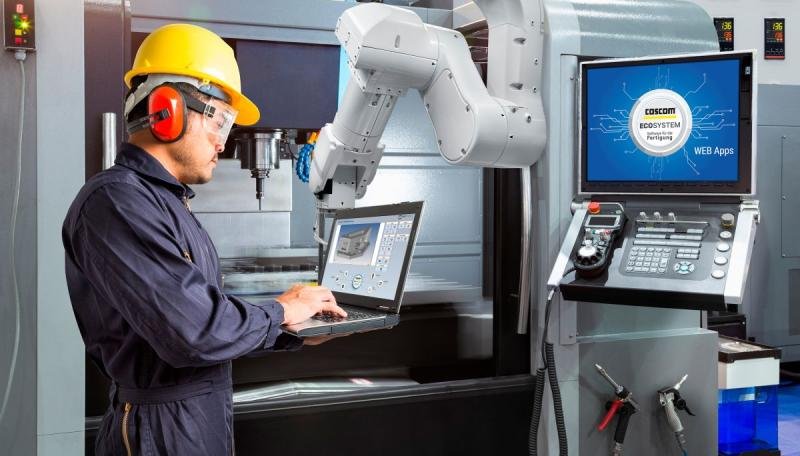
Focus on digitization & networking: With COSCOM Shopfloor IT the link succeeds. (© COSCOM Computer GmbH)
In order to digitalize a company holistically, it is fundamental to network the “office” level (top floor) with the production level (store floor). The challenge lies in linking the individual systems, both horizontally and vertically. Companies are focusing on interoperability and services in the context of the Industrial Internet of Things (IIoT) on their store floor, and specialists with a deep understanding of the process worlds of IT and production play a key role here. COSCOM implements data networking strategies from the ERP system to the store floor of the machining manufacturing industry and supplements or relieves the burden on internal IT departments.
With the introduction of CAx systems, internal technical IT in production companies has gained enormously in importance over the last few decades. In the course of Industry 4.0, holistic networking strategies of store and top floor as well as service concepts in production, IT departments are facing new challenges.
Organizationally, a manufacturing company is usually divided into business and technical business processes, which in turn lead to work areas such as marketing, design, work preparation, production/manufacturing and dismantling. Computer technology with CA techniques such as CAE, CAD, CAP, CAM and CAQ is anchored in wide areas of discrete manufacturing in “top floor” (engineering and office applications) and “store floor” (production). The term “virtual machining” is used in the production environment. This refers to a bundling of processes relating to the deep integration of CAD with CAM, machine simulation and subsequent processes, such as post-processing with NC code creation.
For some years now, companies have been focusing on interoperability and services in the context of the Industrial Internet of Things (IIoT) in the area of their store floor. All in all, the influence of IT in manufacturing companies has continued to grow in importance over time, and the relocation of individual IT systems is at the forefront of the minds of those responsible.
Central networking on the store floor with links to the top floor
The successful implementation of an end-to-end digitalization project right down to the store floor requires a deep understanding of the process worlds of IT and production in addition to the ability to cooperate. Due to the technical nature and heterogeneous infrastructure of production, dovetailing a common understanding is difficult in itself. The physical separation of top floor and store floor also adds to the complexity. These challenges can be overcome by introducing an “intermediate layer” that acts as the connecting link. Even if the terms for this are still quite unspecific, it seems clear that the goal is a new kind of “process excellence”. The department that deals with these issues is often referred to as “shopfloor IT”. In most cases, these are highly trained experts with a strong affinity for IT topics.
The wave of digitalization with its specific requirements for more and more flexibility also means that manufacturers of monolithic IT systems have to open up under the impression of “standardization”, whether driven by ERP or PLM projects, for example. It is therefore assumed that the trend towards the emergence of new process platforms will intensify.
The end-to-end digitalization of store floor processes such as paperless production is still in its infancy compared to the successes on the top floor, which is of course also due to the heterogeneous infrastructure there and the associated process diversity. The potential in terms of process optimization, greater efficiency and efficient use of resources is huge, so it is understandable that digitalization is now a central IT topic.
IT expertise and process know-how for successful digitalization projects
One example is the combination of engineering with production: the complete tool and NC program for the manufacture of the product are created from ERP data and CAD drawings, and machine simulation can be used to carry out a precise collision check of the tool and blank. All relevant production data, including change management, can be transferred to the machining center or machine tool in a paperless process. Ideally, the entire process is mapped in a process platform that interoperably integrates all IT systems involved in the process via a central database. This makes it possible, for example, to create a digital twin of the tool with all its advantages.
Store floor and top floor are merging and many applications overlap. The clear demarcation between ERP, PLM and MES is receding into the background. The challenge for IT managers is to link the individual systems, both horizontally and vertically. The decisive factor here is not only IT competence, but also the corresponding process know-how and technical expertise, e.g. in the machining process. The seamless design of data processes and the use of synergies are essential components of digitization projects in CNC production. COSCOM implements data networking strategies from the ERP system to the store floor of the machining manufacturing industry and supplements or relieves the burden on in-house IT departments. The COSCOM specialists focus on the areas of data and information networking, the targeted use of a tool management and production information system and the optimum design of a CAD/CAM process chain through to a highly effective automation solution. The combination of process consulting, in-house developed software solutions and project implementation stands for a successful and timely implementation time, rapid productive use and economic amortization time of a digitization project.
Further information can be found at
LEAD Industrie-Marketing GmbH
Hauptstraße 46
83684 Tegernsee
Germany
http://www.lead-industrie-marketing.de
Herr André Geßner
+49 8022 91 53 188
+49 8022 91 53 189
info@lead-industrie-marketing.de
COSCOM is a leading software system house that standardizes, networks and optimizes production data in the machining industry. The connection between the ERP system and production is a top priority. Projects in tool management, tool and data management, CAD/CAM and machine simulation as well as Infopoint / DNC networking are realized around the CNC machine. Competence in consulting and target-oriented project management are the basis for joint success – one contact, one responsibility, one successful project!
This release was published on openPR.















